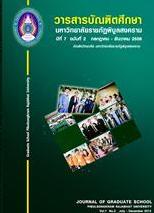การจัดการวิสาหกิจชุมชนตามแนวปรัชญาเศรษฐกิจพอเพียง ในจังหวัดนครสวรรค์
Keywords:
เศรษฐกิจพอเพียง, การจัดการ, วิสาหกิจชุมชน, e-GP, Sub-district administrative organization, proficiency of managementAbstract
วัตถุประสงค์ในการศึกษาครั้งนี้ 1) เพื่อศึกษาการจัดการวิสาหกิจชุมชนและการปฏิบัติตามแนวปรัชญาเศรษฐกิจพอเพียงในจังหวัดนครสวรรค์ 2) เพื่อเปรียบเทียบข้อมูลส่วนบุคคลกับการปฏิบัติตามแนวปรัชญาเศรษฐกิจพอเพียงในจังหวัดนครสวรรค์ และ 3) เพื่อศึกษาความสัมพันธ์ระหว่างการจัดการวิสาหกิจชุมชนกับการปฏิบัติตามแนวปรัชญาเศรษฐกิจพอเพียงในจังหวัดนครสวรรค์ ใช้จำนวนกลุ่มตัวอย่าง 218 ตัวอย่าง ได้แก่ ผู้บริหารวิสาหกิจชุมชนในจังหวัดนครสวรรค์ โดยนำผลที่ได้มาวิเคราะห์ข้อมูลด้วยการหา ความถี่ ร้อยละ ค่าเฉลี่ย ส่วนเบี่ยงเบนมาตรฐาน เปรียบเทียบความแตกต่างด้วยค่า t-test และการวิเคราะห์ความแปรปรวนทางเดียว (One Way ANOVA) การวิเคราะห์ความสัมพันธ์ด้วยสัมประสิทธิ์สหสัมพันธ์ (Pearson Correlation) และการวิเคราะห์ถดถอยพหุแบบปกติ (Multiple Regression analysis) ด้วยวิธี Enter
ผลการวิจัยพบว่า กลุ่มตัวอย่างส่วนใหญ่เป็นเพศหญิง อายุเฉลี่ย 44.21 ปี ตำแหน่งกรรมการร่วม ระดับการศึกษาประถมศึกษา รายได้ 5,000-10,000 บาท/เดือน
1. การจัดการวิสาหกิจชุมชน กลุ่มตัวอย่างส่วนใหญ่ให้ความสำคัญกับด้านค่านิยมร่วมมากที่สุด รองลงมาคือ บุคลากร ทักษะ โครงสร้าง กลยุทธ์ ระบบ และรูปแบบ การปฏิบัติตามแนวปรัชญาเศรษฐกิจพอเพียง กลุ่มตัวอย่างให้ความสำคัญกับแนวปรัชญาเศรษฐกิจพอเพียง ด้านความมีเหตุผลมากที่สุด รองลงมาคือ ด้านเงื่อนไขคุณธรรม ด้านเงื่อนไขความรู้ ด้านการมีภูมิคุ้มกันในตัวที่ดี และด้านความพอประมาณ
2. ข้อมูลส่วนบุคคลด้าน เพศ ระดับการศึกษา และรายได้มีผลต่อการให้ความสำคัญในปรัชญาเศรษฐกิจพอเพียง สำหรับด้านตำแหน่งไม่มีความแตกต่างในการปฏิบัติตามแนวปรัชญาเศรษฐกิจพอเพียงที่ระดับนัยสำคัญที่ 0.05
3. การจัดการวิสาหกิจชุนมีความสัมพันธ์กับการปฏิบัติตามแนวปรัชญาเศรษฐกิจพอเพียงร้อยละ 87.9 โดยด้านโครงสร้าง รูปแบบ และค่านิยมร่วมมีความสัมพันธ์ทางบวกกับการปฏิบัติตามแนวปรัชญาเศรษฐกิจพอเพียง แต่สำหรับการจัดการด้านกลยุทธ์มีผลทางตรงกันข้ามกับการปฏิบัติตามแนวปรัชญาเศรษฐกิจพอเพียง และด้านระบบ บุคลากรและทักษะไม่มีผลต่อการปฏิบัติตามแนวปรัชญาเศรษฐกิจพอเพียง
Comnunity enterprise management by sufficient economic theory in Nakhonsawan
The purposes of this study were to study 1) community enterprise management and action by Sufficient Economic Theory in Nakhon Sawan 2) to compare characteristics of peoples that affected action by Sufficient Economic Theory in Nakhon Sawan , and 3) to study the relationship between community enterprise management and action by Sufficient Economic Theory in Nakhon Sawan. The sample of this research included all 218 community enterprises. Data collection was done by using the questionnaires. The statistics involved were quantitative and were presented in percentages, arithmetic means, standard deviation and Pearson correlation. The hypothesis testing employed the Independent sample t-Test, One-Way ANOVA of Variance Pearson correlation and Enter Multiple regression analysis.
The findings can be concluded as follows: The characteristics of community enterprise were female, with average age of 44.21 years old, office in J HYPERLINK "http://dict.longdo.com/search/joint%20committee" oint committee, highest education level of mostly primary education and average income of 5,000-10,000 Bath/Mont.
1. Community enterprise management from sample at high level that the sample focus on (1) Shared values (2) Staff (3) Skill (4) Structure (5) Strategy (6) System and (7) Style, action by Sufficient Economic Theory from sample at high level that the sample focus on (1) Reasonable mostly and then were (2) Moral (3) Knowledge (4) Self-immunity (5) Moderation.
2. The different in characteristics of community enterprise (Sex, Graduated and Income) did affect action by Sufficient Economic Theory in Nakhon Sawan as significantly at the level of 0.05
3. Community enterprise management could forecast the action by Sufficient Economic Theory at 87.9 %. Structure, Style and Shared values factors were positive forecasts. Strategy were negative forecasts, and System and Staff were not related to competitiveness of SMEs in Nakhon Sawan.
Downloads
How to Cite
Issue
Section
License
Any articles or comments appearing in the Journal of Humanities and Social Sciences, Rajabhat Phibulsongkram University, are the intellectual property of the authors, and do not necessarily reflect the views of the editorial board. Published articles are copyrighted by the Journal of Humanities and Social Sciences, Rajabhat Phibulsongkram University.









